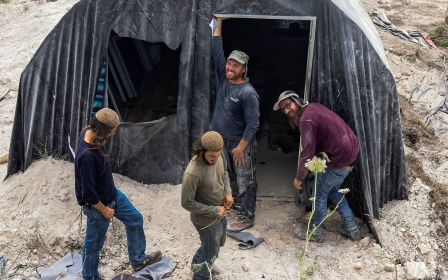Israel: Justice minister says 'Jews are not ready to live with Arabs'

The Israeli Justice Minister Yariv Levin said on Sunday that the purchase of houses by Palestinians in towns and cities in Israel has pushed Jewish people to leave these areas.
The comments were made during a meeting on Sunday where Levin made the case that the Supreme Court needs to feature judges who can “understand” why Jewish Israelis wouldn't want to “live with Arabs".
“Arabs buy apartments in Jewish communities in the Galilee and this causes Jews to leave these cities, because they are not ready to live with Arabs. We need to ensure that the Supreme Court has justices who understand this,” said Levin, according to the Kan public broadcaster.
Levin, one of the chief architects of judicial overhaul plans that would see greater political control over the judiciary, made the comments in support of pushing ahead with the controversial reforms.
Israeli Prime Minister Benjamin Netanyahu was forced to pause his plans following mass protests and an international outcry.
The cabinet meeting on Sunday also discussed a new government proposal to assert “Zionist values” in government policy, which critics have argued could enable Jewish Israelis to receive preferential treatment in housing planning and construction.
Israel’s Supreme Court ruled in 2000 that it was illegal to prevent Palestinian citizens of Israel from purchasing a house in a given community.
In 2011, the Israeli government passed the Admission Committee Law. This allows small communities - particularly the Galilee and the Negev, where there is a significant presence of Palestinians - to screen incoming residents.
The law, which many believe is aimed at keeping Palestinians out of Jewish communities, has since been upheld in court.
21 weeks of protests
In March, Netanyahu announced a "pause" to allow for talks on the reforms, which were moving through parliament and have split the nation.
The ongoing dialogue produced no major breakthrough, and last week parliament approved the state budget, with Netanyahu vowing to "continue our efforts to reach understandings as broad as possible on the legal reform".
On Saturday last week, Israelis took to the streets of Tel Aviv for the 21st straight week of protests against the far-right government's judicial reform plans just days after parliament approved the state budget.
Protesters gathered in other major cities, Haifa and Beersheba, as well as at dozens of junctions and locales throughout the country, to decry what they perceive as a threat to Israel's democracy.
The government's reform proposals would curtail the authority of the Supreme Court and give politicians greater powers over the selection of judges.
Middle East Eye propose une couverture et une analyse indépendantes et incomparables du Moyen-Orient, de l’Afrique du Nord et d’autres régions du monde. Pour en savoir plus sur la reprise de ce contenu et les frais qui s’appliquent, veuillez remplir ce formulaire [en anglais]. Pour en savoir plus sur MEE, cliquez ici [en anglais].




